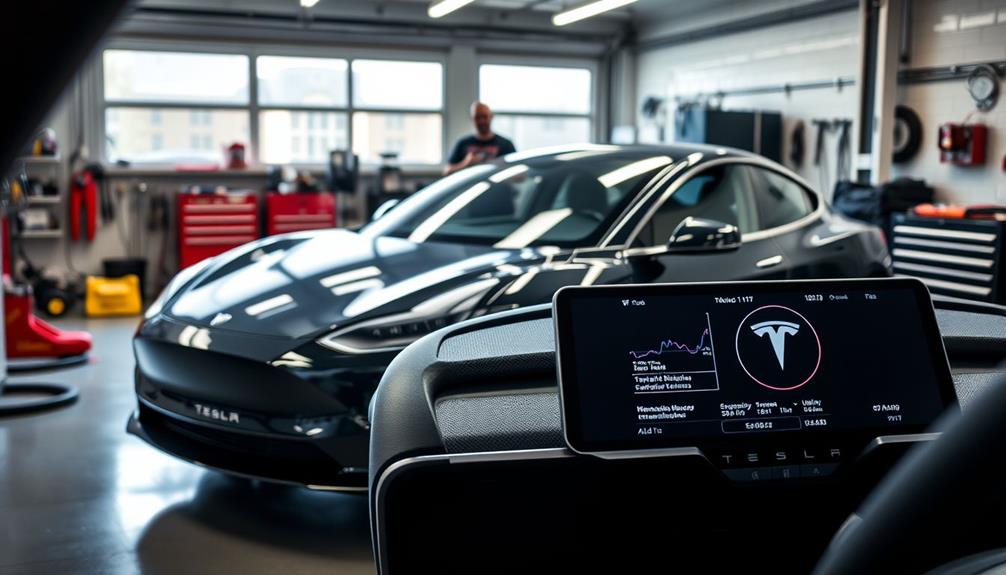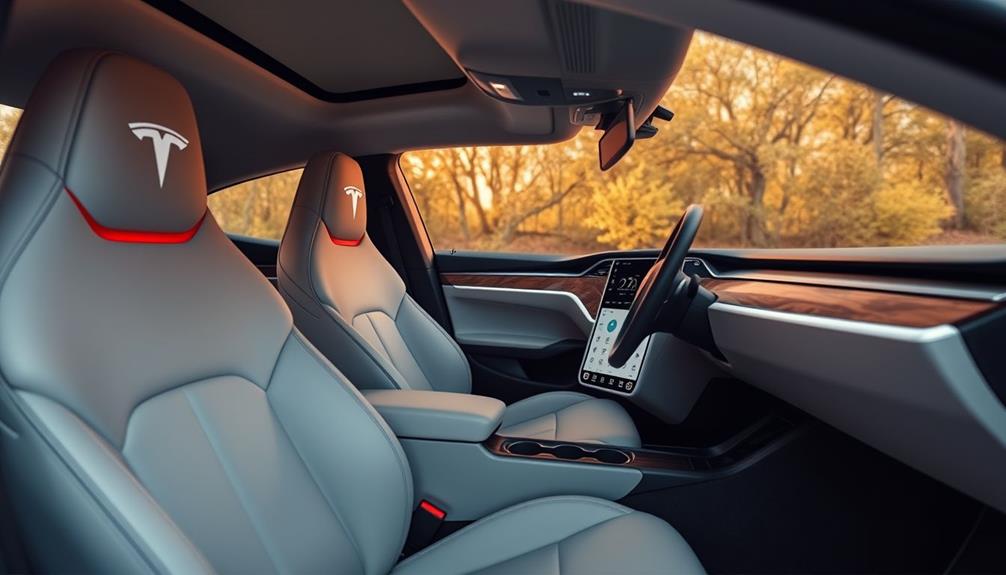Charging a Tesla typically costs you between $8.28 and $14.40 for a full charge at home, making it a budget-friendly option compared to gas vehicles. If you're using a Supercharger, expect to pay $6.01 to $32.78 for a full charge depending on the model. Your monthly costs will range from $36 to $53, and you can lower expenses further by charging during off-peak hours. Overall, driving a Tesla is considerably cheaper than traditional gas vehicles. Want to learn more about different charging options and their impact on your finances?
Key Takeaways
- Charging at home costs between $8.28 and $14.40 for a full charge, with an average daily cost of about $2.04.
- Supercharging rates range from $0.25 to $0.50 per kWh, with full charge costs for Model 3 between $6.01 and $32.78.
- Monthly home charging expenses typically range from $36 to $53, significantly lower than gas vehicle fueling costs.
- Utilizing solar energy can reduce charging costs to $3.11 to $5.40 per charge, with potential long-term savings after solar system payoff.
- Overall, Tesla's operational costs are around 6.1 cents per mile, compared to 10.1 cents per mile for gas vehicles.
Cost to Charge at Home

Charging your Tesla at home can be surprisingly affordable, with costs ranging from $8.28 to $14.40 for a full charge in 2024, depending on your model and battery size. The average cost to fully charge is substantially lower than public charging options, typically between $0.10 to $0.30 per kWh.
For ideal home charging, consider installing a Level 2 charger, which not only improves charging efficiency but also helps maintain your battery's health. With a Level 2 charger, you can complete a full charge in about 8 to 12 hours.
If you own a Tesla Model 3, you can expect an estimated daily charging cost of around $2.04, translating to a yearly charging cost of approximately $614.95. By utilizing off-peak electricity rates, you can further reduce your charging costs, making home charging an economical choice.
Essentially, understanding your electricity rates and enhancing your charging habits can greatly impact your overall cost to charge. With these strategies, you'll enjoy the benefits of electric driving without breaking the bank.
Pricing at Superchargers

When you find yourself needing to charge on the go, Tesla Supercharger stations offer a convenient option. The cost of charging can vary based on location and time, but here's what you can expect:
- Charging rates typically range from $0.25 to $0.50 per kilowatt-hour.
- A full charge for the Model X averages between $10.45 and $57.00.
- For the Model 3, expect to pay between $6.01 and $32.78 for a full charge.
- Additional fees may apply, such as idle fees of $0.50 per minute and congestion fees of $1.00 per minute during peak times.
Superchargers can add about 200 miles of range in just 15 minutes, making them ideal for long trips. Furthermore, many Tesla owners have reported that their vehicles have maintained a high level of performance even after several years of use. This indicates that the Tesla mileage lifespan is impressive, and with the convenience of superchargers, they can continue to be a reliable option for long-distance travel. In fact, the combination of Tesla’s long-lasting mileage lifespan and the efficient recharge time of superchargers make it a compelling choice for those looking for a dependable electric vehicle for extended journeys.
Keep in mind that the total cost will depend on how long you charge and the specific rate at the Supercharger station you choose.
By being mindful of idle and congestion fees, you can better manage your overall charging costs.
With a little planning, charging your Tesla on the road can be both efficient and economical.
Monthly Charging Expenses

When you think about your monthly charging expenses for a Tesla, home charging can really save you money compared to public options.
If you're charging at home, you might spend just $8.28 to $14.40 for a full charge, while using Superchargers could hike your costs.
Understanding these differences can help you manage your budget effectively.
Home Charging Savings
If you're weighing the financial benefits of owning a Tesla, home charging offers significant savings compared to traditional gas vehicles. Your monthly charging costs typically range from $36 to $53, depending on your model and driving habits. This is a fraction of what you'd spend on gas!
Here are some key points to weigh for home charging savings:
- Full Charge Costs: Charging a Tesla at home costs between $8.28 and $14.40 for a full charge.
- Average Cost Per Mile: You'll pay about 4.56 cents per mile for charging, compared to 13.73 cents for gasoline vehicles.
- Level 2 Home Charger: Using a Level 2 home charger boosts efficiency and battery health, optimizing your monthly expenses.
- Solar Panel Integration: Charging with solar panels can lower your monthly costs to as low as $24, drastically reducing your operational expenses.
Supercharger Expense Analysis
Supercharging your Tesla can be a convenient option, but it often comes with higher monthly expenses compared to home charging. Depending on your model and driving habits, expect to pay between $36 and $53 each month for Supercharger usage.
For the Model 3, average costs can range from $6.01 to $32.78, while the Model X could set you back between $10.45 and $57.00.
The rates at Supercharger stations typically range from $0.11 to $0.60 per kWh, and keep in mind that additional fees for idle time or congestion can further increase your costs.
On average, you might pay around $22 to achieve about 250 miles of range, which is a fast yet potentially pricey way to recharge.
Charging at Supercharger stations adds about 200 miles of range in just 15 minutes, making it a great option for quick stops.
However, when considering your overall budget for electricity, it's important to weigh these Supercharger expenses against the savings you gain from home charging.
Being aware of these costs can help you make better decisions for your Tesla's charging needs.
Factors Influencing Charging Costs

Several factors influence the costs associated with charging your Tesla, making it essential to take them into account for budgeting purposes.
Here are four key elements that can impact your charging costs:
- Electricity Rates: These can vary greatly, averaging around $0.16 per kWh in the U.S., with higher rates in states like California and Hawaii.
- Battery Size: The Tesla model you choose affects charging frequency and costs. Larger batteries require more energy to charge, leading to higher expenses.
- Charging Efficiency: The type of charger also plays a role. Level 2 chargers offer about 85% efficiency, while Level 3 chargers (DC fast charging) can exceed 90%, affecting how much energy you actually consume.
- Time of Day: Charging during off-peak hours usually results in lower electricity rates, helping you save on costs.
Additionally, local climate conditions can impact battery efficiency, especially in colder weather, which may increase energy consumption while driving.
Solar Charging Benefits

Switching to solar charging for your Tesla can lead to significant cost savings, with charging expenses dropping to around $3.11 to $5.40 per charge.
Not only does this reduce your overall operational costs, but it also helps lower your carbon footprint, promoting a more sustainable lifestyle.
Cost Savings Overview
Harnessing the power of solar energy to charge your Tesla can lead to significant cost savings. By investing in solar panels, you can drastically reduce the cost of charging compared to traditional energy sources. Here's how it breaks down:
- Low Charging Costs: Charging your Tesla with solar energy can cost around $0.06 per kWh, translating to just $3.11 to $5.40 for a full charge.
- Average System Cost: The average cost of a solar system is about $19,000, but you could see returns in as little as five years due to lower energy costs.
- Long-Term Savings: After paying off your solar system, the electricity generated for charging becomes effectively free, leading to substantial long-term savings.
- Sustainable Options: Just five solar panels can meet your charging needs, making this a cost-effective option for EV owners.
Additionally, community solar and Green Power Plans can enhance the financial benefits, offering competitive pricing for charging costs.
Environmental Impact Benefits
Charging your Tesla with solar energy consistently delivers impressive environmental benefits that go beyond mere cost savings. By utilizing solar charging, you greatly reduce your reliance on fossil fuels, which in turn lowers greenhouse gas emissions associated with electricity generation. This shift not only aligns with your environmental goals but also contributes to a sustainable lifestyle.
The average charging costs drop dramatically to about $0.06 per kWh, making it an economical choice compared to traditional grid electricity rates. Plus, with a solar system cost around $19,000, you can install just five solar panels to cover your Tesla's charging needs. This investment offers a return on investment (ROI) in as little as 5 to 8 years, potentially leading to free electricity for charging post-recovery.
Ultimately, by embracing renewable resources like solar energy, you actively decrease your carbon footprint associated with vehicle operation. Charging your Tesla with solar power isn't just a smart financial decision; it's a commitment to a greener future and a step toward achieving your personal and broader environmental goals.
Tesla Vs. Gas Vehicle Costs

When it comes to operating costs, electric vehicles (EVs) like Teslas offer a significant advantage over traditional gas-powered vehicles. The savings potential is hard to ignore, especially when you consider the following:
- Charging a Tesla costs about 4.56 cents per mile compared to 13.73 cents per mile for a gas vehicle.
- The average yearly fueling cost for gas vehicles is $1,850.42, while Tesla's annual charging costs range from $599 to $778.
- Over a vehicle's lifetime, you can save about $12,000 when driving a Tesla for roughly 300,000 miles.
- A Department of Energy study shows that EVs cost 6.1 cents per mile to operate, whereas gas vehicles incur 10.1 cents per mile.
With Tesla's monthly charging costs ranging from $36 to $53, compared to the average $143 for gas-powered vehicles, it's clear the financial benefits of owning an electric vehicle are substantial.
Frequently Asked Questions
How Much Does It Cost to Charge a Tesla at a Charging Station?
To charge at a station, you'll typically pay between $6 and $57, depending on your model and location. Rates usually range from $0.25 to $0.50 per kilowatt-hour, so plan accordingly.
Is It Cheaper to Charge a Tesla at Home or Supercharger?
Charging at home's usually cheaper than using a Supercharger. You'll save more with a Level 2 charger, while Supercharging can spike costs. So, if you want savings, stick to home charging for your Tesla.
Do You Have to Pay to Charge a Tesla in Public?
Yes, you often have to pay to charge a Tesla in public. Costs vary based on location and provider, so it's smart to check rates before plugging in, especially at Supercharger stations or membership-based options.
How Long Does It Take to Charge a Tesla at a Charging Station?
When you charge a Tesla at a Supercharger, it takes about 15 to 30 minutes, depending on your model. At home, Level 2 chargers usually require 4 to 10 hours for a full charge.
Conclusion
In the end, charging your Tesla can be quite economical, especially when you consider home charging and the perks of solar energy. While Supercharger prices might vary, your monthly expenses are often less than fueling a gas vehicle. So, it's clear that going electric can save you a pretty penny. Whether you're charging at home or on the go, it's a smart move that keeps your wallet happy while helping the environment.










